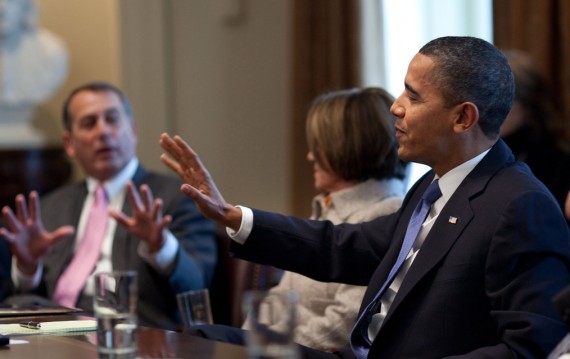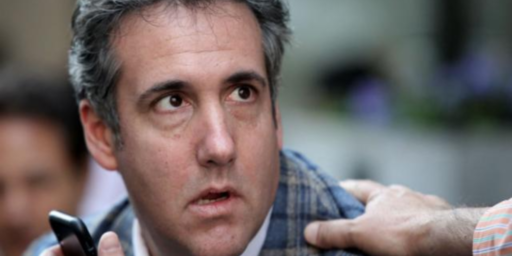Why Congress Won’t Stop the Drone War
My latest for World Policy Review, "Oversight or Not, Drones Are Here to Stay," has posted.
My latest for World Policy Review, “Oversight or Not, Drones Are Here to Stay,” has posted. An excerpt:
In “The Imperial Presidency: Drone Power and Congressional Oversight,” Michael Cohen argues persuasively that the U.S. Congress has abdicated its constitutional and statutory responsibility to reign in the executive branch in matters of national security policy. Then again, few who have been paying attention this past decade — some would say, the past several decades — need much convincing on that point.
Yet, while I agree with Cohen that we desperately need Congress to do its job here as a matter of principle, it’s far from clear that it would change our policy.
Cohen cites the extraordinary decision to kill American citizens Anwar al-Awlaki and Samir Khan in a Predator strike in Yemen last September as particularly troubling. While Cohen and I both find risible the administration’s claim that its internal deliberations over the assassination of U.S. citizens qualify as their constitutionally guaranteed right to “due process,” it’s pretty clear that we’re in the minority.
In the immediate aftermath of the raid, President Barack Obama earned effusive praise across the political spectrum.
Rep. Peter T. King, the Republican chairman of the House Homeland Security Committee, issued a statement declaring, “The killing of al-Awlaki is a tremendous tribute to President Obama and the men and women of our intelligence community.”
Mitt Romney, already the Republican frontrunner in the race to unseat Obama, called the killing “a major victory in our fight against Islamist terrorism and proper justice for the numerous attacks and plots [Awlaki] inspired or planned against America.”
Obama’s fellow Democrats were similarly effusive.
Meanwhile, a June survey by the Pew Research Center found that these strikes were equally popular with the American public, with 62 percent approving, “including most Republicans (74 percent), independents (60 percent) and Democrats (58 percent).” And a February ABC News/Washington Post poll found even stronger support. The Post write-up drolly noted, “83 percent of Americans approve of Obama’s drone policy, which administration officials refuse to discuss, citing security concerns.”
The full article is behind a subscription gateway but it should be available for free to those following the link from OTB.







it’s easy to approve the use of Drones because it results in the loss of no American lives and the commitment of no American troops. People my have some misgivings and feel uneasy about it but …. no American body count.
I expect to see drones as a standard tool of law enforcement within the US by 2020. Such is romance of drones- a constant eye in the sky with the operator shielded from harm, a bloodless technological fix.
My guess, w/o reading the article: because Congresscritters do not want to have to deal with overseeing things. That would require: a) work (boo!) and, more importantly: b) accountability.
They’d rather have POTUS handle it and if it gets messy he can take the blame. It’s risk-free for them. As it is for all of us, unless/until there is blowback (and as I think we all know from 9/11, we are not allowed to discuss blowback in the event of a terror attack. That’s “blaming America”).
Feh.
It’s been a while since I had the intestinal fortitude to look deeply into the use of weaponized drones, but when I last did, there was a significant problem with having CIA employees and/or civilian contractors flying drones in Afghanistan and dropping ordinance on bad guys. Namely, having non-uniformed-military personnel engaging in clearly military operations is a pretty explicit and clear-cut violation of the Geneva Conventions. Was anything ever done about that, or did everyone just stick their fingers in their ears and agree to pretend it never happened?
@stonetools: As long as it stays an eye and not a SWAT weapon. I can see DEA using weaponized drones to torch booby trapped marijuana fields and watching it escalate from there. Come to think of it, are they being used already in Colombia or Mexico?
I would increase tenfold the funding for the drone program. It’s the best thing the government has done in quite a while.
“… a June survey by the Pew Research Center found that these strikes were equally popular with the American public, with 62 percent approving”
And that is what bothers me. In my mind such approval is only possible because these strikes don’t spill American blood. I am convinced the story would be quite different if we used manned aircraft which would be regularly shot down and hence a steady flow of coffins baring the American flag came back home.
All presidents tend to develop a God complex as soon as they are inaugurated. Giving them the ability to strike anywhere anytime with hardly any accountability is NOT a good thing for democracy as I understand it.
@Murray: “Go ahead. Make my day”
Well the Geneva Convention was quaint while it lasted. America cannot possibly be held to account. Who is going to compel it? And then who would do the world’s dirty work in a “clean and efficient” manner?